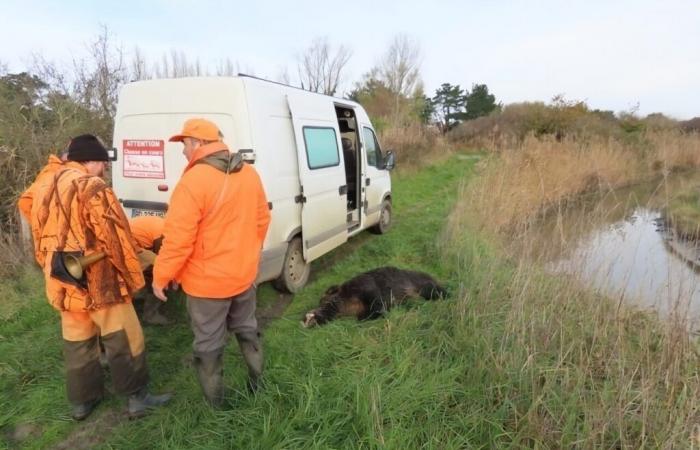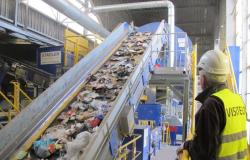Par
Editorial Courrier du Pays de Retz
Published on
Nov 12 2024 at 1:21 p.m
See my news
Follow Le Courrier du Pays de Retz
A few days before silage, Jeremy Maillard can only see the damage. “A large part of my corn production is lying in one of my fields,” says the milk producer, based in Pornic (Loire-Atlantique), on the other side of the Route bleue.
There is no doubt about the origin of the devastation. “It’s because of the wild boarswe see the traces of their paws,” he breathes. And when it's not the harvest that suffers, it's the tools.
They make holes in our meadows to look for earthworms and when we come to mow, we fall in with our equipment.
“I saw around twenty wild boars”
On the other side of the country of Retz, Alexis Lorgespecialized in large culture in Port-Saint-Père, faces the same problems.
“Last week, while working in the evening, I saw around twenty wild boars. Like me, colleagues are seeing more and more damage on their plots,” observes the Young Farmers unionist.
One figure sums up the situation in Loire-Atlantique: over the last four months, the hunting federation has received almost so many requests for compensation than in the year 2023. Because yes, it is the hunters who pay for the damage caused by wild boars.
“Since July, we have had 337 000 € of damage, compared to €350,000 over the whole of last year”, completes Denis Dabodirector of the Loire-Atlantique hunting federation, on the front line on the subject.
The country of Retz is also one of the most affected sectors of the department.
Why do hunters pay for damage in the fields?
“Before 1968, farmers had the right to kill game to defend their crops. Since then, it is the hunters who have taken over the management of wildlife and have undertaken to compensate them in the event of damage,” recalls Denis Dabo, director of the Loire-Atlantique hunting federation. It was they who decided to reintroduce certain species into territories where they had disappeared. “The wild boar escaped us a little,” admits the director. To finance the damage, the Loire-Atlantique associations must pay, each year, 60 centimes per hectare of land on which its members practice hunting. In 2023, the amount of compensation was €350,000, for a total of 319 cases.
The number of “samples” is increasing
On a daily basis, it is the hunters whose mission is to “regulate” the population of these mammals, through hunts or individual hunting.
“The number of samples in Loire-Atlantique is only increasing: we have done 8,000 in 2023, compared to 2,500 seven years ago,” explains the director. Insufficient to regulate the population.
For its director, this proliferation is due to multiple factors. “As the climate changes, winters are becoming less and less harsh. Mortality among wild pigs is therefore almost non-existent, which was not the case in the past. »
Each year, the increase in wild boars would be from 100 to 300%. Exponential. “There are also more refuge areas for the species, with the sprawl of a city like Nantes, the development of four roads… We also find reserves where hunting is prohibited, in the country of Retz, along of the Loire estuary. »
Last factor: the presence of food in abundancewith many cereal fields for raising cows. While at the same time, the number of hunters continues to decline: minus 2% each year, according to the federation.
Animalists opposed to hunting
If wild boars are a scourge for crops, they are also for the road safety : in 2016, 213 collisions between a wild boar and a vehicle were recorded in Loire-Atlantique.
Biodiversity is also impacted. “The wild boar eats everything,” says Denis Dabo. Our role, as a federation, is to transmit the greatest variety of species to future generations. And it requires a balance.
This work of hunters is called into question by certain associations, such as One Voiceopposed to this practice, while recognizing that proliferation is a problem.
“We must not entrust this mission to people whose leisure it is,” decides Muriel Arnalpresident of the animal association.
According to her, hunters would not want to effectively regulate wild boars, to be able to continue killing them in the future.
The wolf to regulate the wild boar?
The president is campaigning for the work to be done by a predator: the wolf.
“If hunters cannot stem the proliferation, how many wolves would it take to achieve this,” responds skeptically, Denis Dabo, who says he does not defend hunting at all costs.
To support her point, Muriel Arnal cites an example in the Dromewhere a few wolf individuals would manage to be effective. Nature would regulate itself.
The director refers to another case: that of our Swiss neighbors, in the canton of Geneva. After 45 years of banning hunting, exemptions have been granted to regulate wildlife, as revealed by our colleagues from the Swiss radio television.
Between animalists and hunters, the debate is open.
Quentin DUVAL
Follow all the news from your favorite cities and media by subscribing to Mon Actu.






